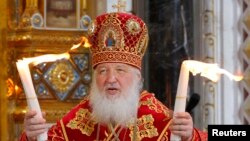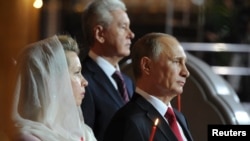Orthodox Christians in Ukraine and Russia on Sunday celebrated Easter -- the holiest day of the Christian calendar -- with their nations locked in conflict and Ukraine's patriarch condemning what he called Russian "aggression" in his homeland.
In his Easter message, Kyiv Patriarch Filaret said there has been aggression and injustice "against our peace loving nation." He also labeled Russia an "enemy" whose attack on Ukraine is doomed to fail.
In Moscow, meanwhile, Russian Orthodox Patriarch Kirill led prayers for Russians in Ukraine and called for peace and cooperation. He was quoted as calling for an "end to the designs of those who want to destroy holy Russia."
The dueling messages came hours after the Ukrainian government announced a pause in security operations to oust pro-Russian militants from buildings they have seized in recent days.
Foreign Minister Andrii Deshchytsia linked the suspension to the Easter holiday to give European monitors more time to organize a special mission aimed at de-escalating tensions in eastern Ukraine.
A VOA correspondent in Kyiv says the diplomat's comments came after wrapping up a meeting with the Organization for Security and Cooperation in Europe and ambassadors from Russia, the United States and the European Union.
Pro-Russian gunmen have seized Ukrainian government buildings in nearly a dozen eastern cities and say they will not surrender until the interim Ukraine government in Kyiv steps down.
Meanwhile, in Moscow Saturday, Kremlin spokesman Dmitry Peskov admitted that Russia had deployed additional security forces to the Ukrainian border in response to the instability in Ukraine. He commented on Rossiya 1 TV.
Russia has previously said its troops were on the border for routine exercises.
President Barack Obama has warned Russia that it could face additional sanctions if it fails to adhere to a new international deal on Ukraine reached Thursday in Geneva.
That agreement, which followed talks between Ukraine, Russia, the United States and the European Union, calls for all government buildings to be evacuated and for the militants to be disarmed.
But it includes few concrete measures for ending the crisis, and many Western leaders are skeptical about Russia holding up its end of the bargain.
In his Easter message, Kyiv Patriarch Filaret said there has been aggression and injustice "against our peace loving nation." He also labeled Russia an "enemy" whose attack on Ukraine is doomed to fail.
In Moscow, meanwhile, Russian Orthodox Patriarch Kirill led prayers for Russians in Ukraine and called for peace and cooperation. He was quoted as calling for an "end to the designs of those who want to destroy holy Russia."
The dueling messages came hours after the Ukrainian government announced a pause in security operations to oust pro-Russian militants from buildings they have seized in recent days.
Foreign Minister Andrii Deshchytsia linked the suspension to the Easter holiday to give European monitors more time to organize a special mission aimed at de-escalating tensions in eastern Ukraine.
A VOA correspondent in Kyiv says the diplomat's comments came after wrapping up a meeting with the Organization for Security and Cooperation in Europe and ambassadors from Russia, the United States and the European Union.
Pro-Russian gunmen have seized Ukrainian government buildings in nearly a dozen eastern cities and say they will not surrender until the interim Ukraine government in Kyiv steps down.
Meanwhile, in Moscow Saturday, Kremlin spokesman Dmitry Peskov admitted that Russia had deployed additional security forces to the Ukrainian border in response to the instability in Ukraine. He commented on Rossiya 1 TV.
Russia has previously said its troops were on the border for routine exercises.
President Barack Obama has warned Russia that it could face additional sanctions if it fails to adhere to a new international deal on Ukraine reached Thursday in Geneva.
That agreement, which followed talks between Ukraine, Russia, the United States and the European Union, calls for all government buildings to be evacuated and for the militants to be disarmed.
But it includes few concrete measures for ending the crisis, and many Western leaders are skeptical about Russia holding up its end of the bargain.






